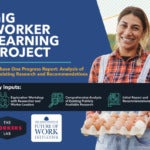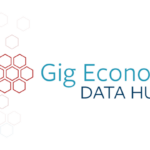People have been working short-term jobs for centuries, but over the past two decades, apps like Uber and Instacart have popularized the idea of a “gig economy.” What does this term really mean, and how does it reflect bigger questions about the quality of jobs in today’s economy?
Despite increased use of the term, there is still a lack of consensus among policymakers, businesses, and society at large regarding who gig workers are, how many exist, and what their needs are. These questions intersect with the ongoing job quality crisis in the US, in which too few workers have good jobs and persistent inequities across race, ethnicity, and gender continue to define the labor market. We need to understand the so-called gig economy in order to know how it contributes to or could solve for this crisis.
To address these issues, The Gig Worker Learning Project, a collaborative effort between the Aspen Institute Future of Work Initiative and The Workers Lab, explores gig work’s connection to job quality. Additionally, the Future of Work Initiative will be hosting a gig worker event in August, providing a platform for discussion and generating ideas to improve job quality in the gig economy and promote economic justice for all workers.

Event: Good Work in the Gig Economy: Building a Sustainable App-based Economy
Although app-based platforms have been around for more than a decade, there’s still little shared understanding of who works in the “gig economy” or what their needs are. Join us virtually on August 8, 2023, from 2 pm to 3:15 p.m. Eastern time, for a panel discussion with speakers from business, research, advocacy, and more. Learn about alternative models of platform-based work, including cooperatives and public options, about policies being introduced to improve gig workers’ lives, and about the research showing us what’s ahead.
Publication: Gig Worker Learning Project — Phase One Progress Report
In this report, co-authored with The Workers Lab, we compare recent studies to demonstrate the lack of a common language around gig work. This absence contributes to widespread confusion and misunderstanding, and it prevents us from meeting workers’ needs.
Resource: Gig Economy Data Hub
The Gig Economy Data Hub — a collaborative project between the Aspen Institute’s Future of Work Initiative and the Cornell School of Industrial and Labor Relations — aims to provide accessible, comprehensive information for anyone interested in understanding the scope and nature of independent and gig work today.

What We’re Reading: Has “Gig Work” Become a Dirty Word?
App-based companies like Uber and Lyft claim to offer a better working experience through higher levels of flexibility. But for many, these companies are associated with unfair working conditions and low wages. Writing in the New York Times, technology reporter Kellen Browning explores the realities of app-based work today.



